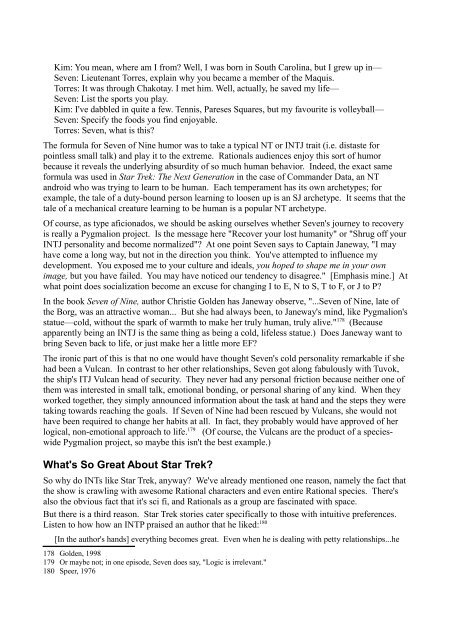Create successful ePaper yourself
Turn your PDF publications into a flip-book with our unique Google optimized e-Paper software.
Kim: You mean, where am I from? Well, I was born in South Carolina, but I grew up in—<br />
Seven: Lieutenant Torres, explain why you became a member of the Maquis.<br />
Torres: It was through Chakotay. I met him. Well, actually, he saved my life—<br />
Seven: List the sports you play.<br />
Kim: I've dabbled in quite a few. Tennis, Pareses Squares, but my favourite is volleyball—<br />
Seven: Specify the foods you find enjoyable.<br />
Torres: Seven, what is this?<br />
The formula for Seven of Nine humor was to take a typical NT or INTJ trait (i.e. distaste for<br />
pointless small talk) and play it to the extreme. Rationals audiences enjoy this sort of humor<br />
because it reveals the underlying absurdity of so much human behavior. Indeed, the exact same<br />
formula was used in Star Trek: The Next Generation in the case of Commander Data, an NT<br />
android who was trying to learn to be human. Each temperament has its own archetypes; for<br />
example, the tale of a duty-bound person learning to loosen up is an SJ archetype. It seems that the<br />
tale of a mechanical creature learning to be human is a popular NT archetype.<br />
Of course, as type aficionados, we should be asking ourselves whether Seven's journey to recovery<br />
is really a Pygmalion project. Is the message here "Recover your lost humanity" or "Shrug off your<br />
INTJ personality and become normalized"? At one point Seven says to Captain Janeway, "I may<br />
have come a long way, but not in the direction you think. You've attempted to influence my<br />
development. You exposed me to your culture and ideals, you hoped to shape me in your own<br />
image, but you have failed. You may have noticed our tendency to disagree." [Emphasis mine.] At<br />
what point does socialization become an excuse for changing I to E, N to S, T to F, or J to P?<br />
In the book Seven of Nine, author Christie Golden has Janeway observe, "...Seven of Nine, late of<br />
the Borg, was an attractive woman... But she had always been, to Janeway's mind, like Pygmalion's<br />
statue—cold, without the spark of warmth to make her truly human, truly alive." 178 (Because<br />
apparently being an INTJ is the same thing as being a cold, lifeless statue.) Does Janeway want to<br />
bring Seven back to life, or just make her a little more EF?<br />
The ironic part of this is that no one would have thought Seven's cold personality remarkable if she<br />
had been a Vulcan. In contrast to her other relationships, Seven got along fabulously with Tuvok,<br />
the ship's ITJ Vulcan head of security. They never had any personal friction because neither one of<br />
them was interested in small talk, emotional bonding, or personal sharing of any kind. When they<br />
worked together, they simply announced information about the task at hand and the steps they were<br />
taking towards reaching the goals. If Seven of Nine had been rescued by Vulcans, she would not<br />
have been required to change her habits at all. In fact, they probably would have approved of her<br />
logical, non-emotional approach to life. 179 (Of course, the Vulcans are the product of a specieswide<br />
Pygmalion project, so maybe this isn't the best example.)<br />
What's So Great About Star Trek?<br />
So why do INTs like Star Trek, anyway? We've already mentioned one reason, namely the fact that<br />
the show is crawling with awesome Rational characters and even entire Rational species. There's<br />
also the obvious fact that it's sci fi, and Rationals as a group are fascinated with space.<br />
But there is a third reason. Star Trek stories cater specifically to those with intuitive preferences.<br />
Listen to how how an INTP praised an author that he liked: 180<br />
[In the author's hands] everything becomes great. Even when he is dealing with petty relationships...he<br />
178 Golden, 1998<br />
179 Or maybe not; in one episode, Seven does say, "Logic is irrelevant."<br />
180 Speer, 1976




